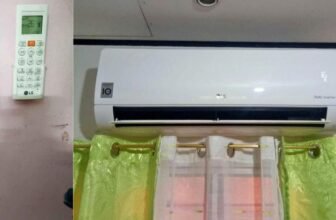
Discovering water leaking from your air conditioner within your apartment can be quite alarming. It’s a common issue that many homeowners encounter, yet it poses the risk of causing damage to your property if not swiftly addressed. The presence of water indicates that something within the cooling system isn’t functioning properly, and understanding the reasons behind this malfunction is the first step towards a solution.
Several factors could lead to water leaking from your air conditioning unit. It might be attributable to a clogged drain line, preventing water from being expelled as it normally should. Alternatively, a damaged or rusted drain pan could be the culprit, failing to contain the condensation your unit produces. There may also be issues with the installation, or with certain parts of the appliance like the air filters or refrigerant levels, which require regular maintenance to prevent leaks and other problems.
By identifying the root cause, you can take appropriate action to fix the leak and prevent future occurrences. Regular maintenance checks are crucial to ensure that your air conditioning system functions efficiently, reducing the risk of leaks and extending the lifespan of your appliance. If the issue persists or seems complex, it’s advisable to seek assistance from a professional to accurately diagnose and rectify the problem, protecting your home from potential water damage.
Common Causes of Air Conditioner Leaks
When your air conditioner leaks water inside your apartment, it often indicates a common problem that can usually be identified and repaired. Here are some of the typical reasons it may happen:
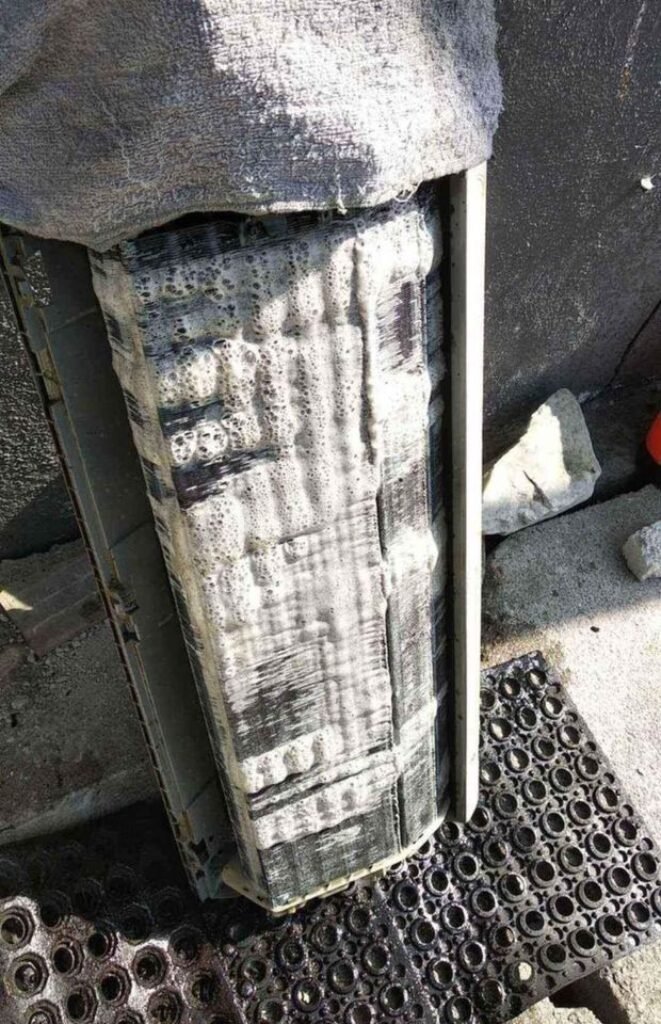
- Dirty Air Filter: When your air filter accumulates too much dirt, it can restrict airflow over the evaporator coils, potentially causing them to freeze over. When they eventually melt, excess water may lead to leaks.
- Blocked Drain Line: Your unit’s condensate drain line can get clogged with debris, preventing water from draining properly and causing it to back up and spill over.
- Damaged or Clogged Drain Pan: Drain pans can crack or corrode over time; if yours is damaged or clogged, water can’t flow to the drain and may start to leak out.
- Low Refrigerant Levels: If the refrigerant level is low, the pressure in your air conditioning system may decrease, leading to a frozen coil which, upon melting, can result in an overflow of water.
- Improper Installation: In some cases, an AC unit that hasn’t been installed correctly can lead to drainage problems. A common installation issue is an incorrect slope of the unit, which prevents water from exiting through the drain line.

It’s crucial to identify the exact cause to effectively fix the leak. Regular maintenance can also help prevent these issues from arising. If you’re unsure about diagnosing the problem, consider consulting a professional for a thorough inspection and repair to protect your home from water damage.
Solutions for Air Conditioner Leaks
When you encounter water leaking from your air conditioner inside your apartment, it’s essential to address the issue promptly. Here are practical solutions to prevent further damage and ensure your unit runs efficiently:
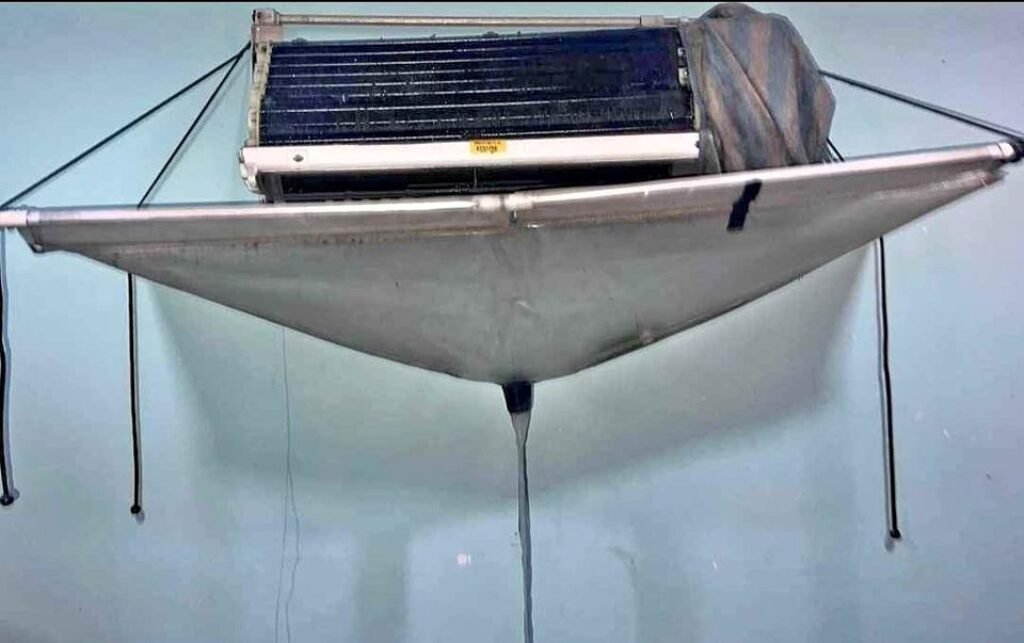
- Cleaning or Replacing the Air Filter: A dirty filter restricts airflow, which can cause the evaporator coils to freeze and then leak water when they melt. Regularly clean or replace your filter to avoid this issue.
- Clearing the Drain Line: Algae and mould can clog the condensate drain line. Use a wet/dry vacuum to suck out the blockage or a mild cleaner to flush the line thoroughly.
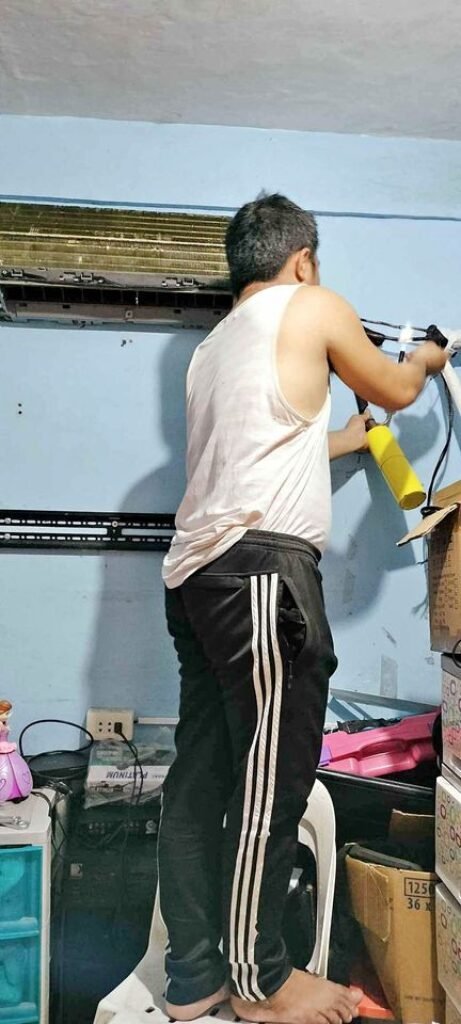
- Repairing or Replacing the Drain Pan: Over time, your AC’s drain pan may become damaged. Inspect the pan for cracks and consider sealing small openings or replacing the pan if necessary.
- Recharging Refrigerant Levels: Low refrigerant can cause low pressure and lead to coils freezing, which results in leaks. It is important to check the levels of refrigerant in your refrigerator and recharge them if they are low. This is a crucial step to ensure that your refrigerator is functioning properly. However, this task should be performed by a professional due to the technical nature of the work.
- Seeking Professional Installation or Repairs: Incorrect AC installation or other mechanical faults can also lead to leaks. If you’ve tried the above steps without success, it’s time to call a certified technician to assess and repair your AC system.
Remember, regular maintenance can prevent many of these issues from occurring. If you’re not confident performing these tasks yourself, it’s always best to seek professional assistance to ensure your AC operates effectively and safely.
Preventing Air Conditioner Leaks
To prevent water leaks from your air conditioner, vigilance and regular maintenance are key. By following a few simple steps, you can avoid the inconvenience and potential damage caused by water leaking into your apartment.
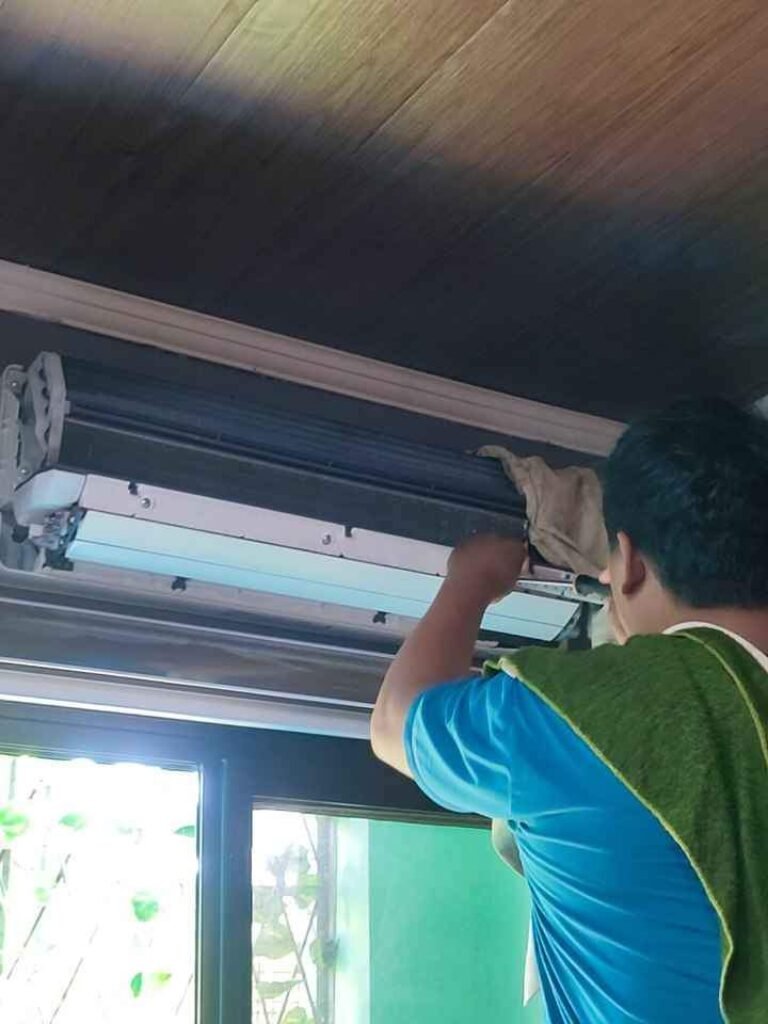
Maintain Regular Air Filter Replacements: Ensure that you replace your air conditioner’s filter according to the manufacturer’s guidelines. A clogged filter can restrict airflow, causing ice to form on the coils and water to leak when it melts.
- Check filters monthly during peak usage
- Replace filters every 1-3 months, or as needed
Schedule Routine Professional Maintenance: An annual check-up by a professional can prevent many issues, including leaks.
- Book a service before the peak AC season
- Ensure they inspect refrigerant levels and system pressures
Clear Your Drain Line: The drain line can become clogged with algae and mould, which can lead to water backup.
- Flush the drain with water
- Use vinegar to kill algae or mold
Monitor Refrigerant Levels: Incorrect refrigerant levels can cause your evaporator coil to freeze and then defrost, leading to excess water.
- Have a professional check and top up refrigerant if needed
Check Installation: Improper installation can cause a variety of issues, including leaks. Make sure that:
- The unit is level
- All connections are secure
By staying on top of these areas, you can greatly reduce the risk of your air conditioner leaking water inside your apartment.
Effects of Air Conditioner Leaks
When your air conditioner leaks, the repercussions can range from mere inconvenience to significant home damage. Here’s an overview of what you could be facing:
- Water Damage to the Home: Persistent leaks can spoil carpets, warp floorboards, and stain ceilings. Over time, the integrity of structural components might be compromised due to prolonged exposure to moisture.
- Inefficient Cooling and Energy Waste: A leaking unit struggles to maintain the desired temperature, leading to inefficient cooling. This inefficiency forces the air conditioner to work harder, ultimately increasing energy consumption and, therefore, your electricity bill.
- Potential Mold and Mildew Growth: Damp areas provide an ideal habitat for mould and mildew, which can grow unimpeded inside walls or under carpets if leaks are left unattended.
Air Quality Concerns:
- Respiratory irritations
- Allergy aggravations
- Unpleasant odours
These can arise from the spores released by mould and mildew.
- Increased Repair Costs: Delaying the repair of a leak can escalate the issue, possibly resulting in more extensive damage to your air conditioning system. Early detection and repair will help keep costs down.
It’s vital to address leaks promptly to prevent these problems and maintain a healthy, comfortable living environment.
When to Contact a Professional
If you encounter persistent dripping or see a puddle forming around your air conditioning unit, it’s time to consult a professional. Water pooling inside the home should not be ignored as continued exposure can lead to water damage or mould growth, which poses serious health risks.
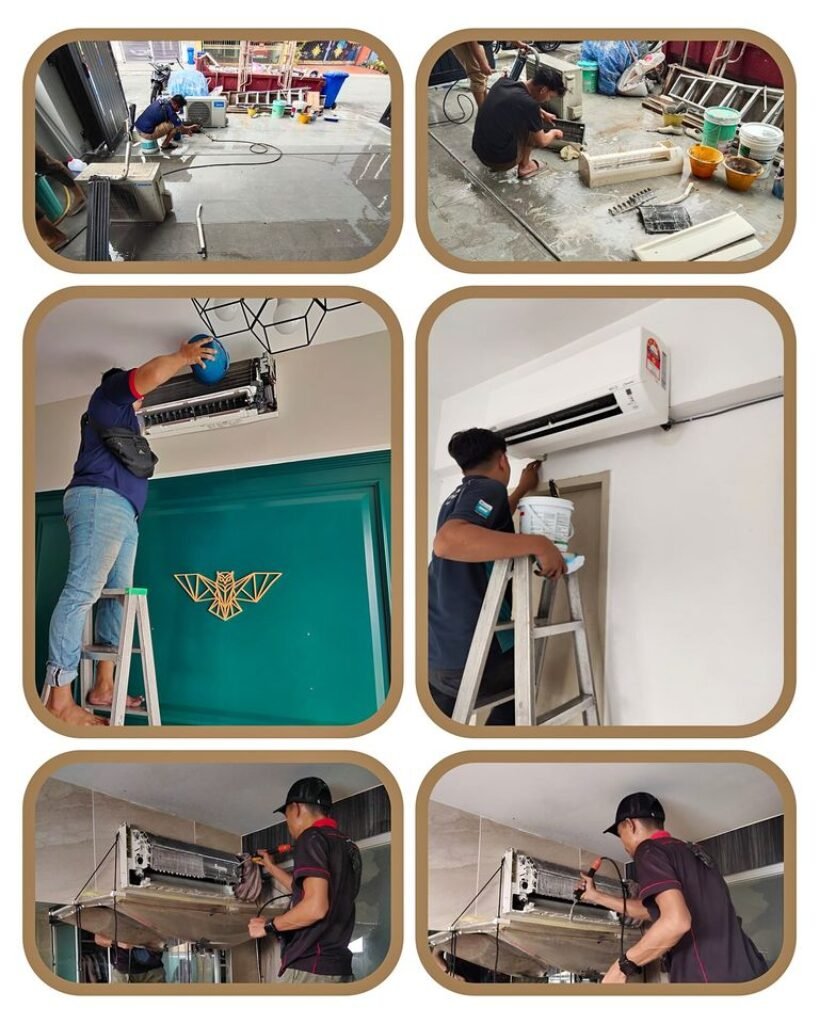
Should your air conditioner emit unusual sounds or odours, it’s best not to investigate on your own. Such indicators often point towards internal issues that require a professional’s attention.
Experiencing inadequate cooling performance despite all typical troubleshooting suggests a deeper problem. If your unit cannot maintain the desired temperature, a professional assessment is necessary.
Remember, dealing with visible water leaks inside your home or signs of water damage can be complex, and incorrect handling could further exacerbate the issue. In scenarios where you notice:
- Wet spots on walls or ceilings
- Musty smells suggest mould
- Discolouration or peeling of paint/wallpapers
- Unexplained increase in humidity levels
It’s crucial to call in an expert who can accurately diagnose and resolve the underlying cause.



